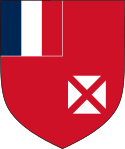
Wallis and Futuna, officially the Territory of the Wallis and Futuna Islands, is a French island collectivity in the South Pacific, situated between Tuvalu to the northwest, Fiji to the southwest, Tonga to the southeast, Samoa to the east, and Tokelau to the northeast.

This page is an overview of the economy of Wallis and Futuna.

The administrative divisions of France are concerned with the institutional and territorial organization of French territory. These territories are located in many parts of the world. There are many administrative divisions, which may have political, electoral (districts), or administrative objectives. All the inhabited territories are represented in the National Assembly, Senate and Economic and Social Council and their citizens have French citizenship and elect the President of France.
A territorial collectivity is a chartered subdivision of France, with recognized governing authority. It is the generic name for any subdivision with an elective form of local government and local regulatory authority. The nature of a French territorial collectivity is set forth in Article 72 of the French Constitution of 1958, which provides for local autonomy within limits prescribed by law.
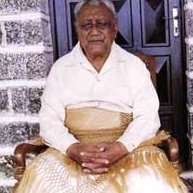
Tomasi Kulimoetoke II was the 50th Lavelua (King) of Wallis Island, which is known as Uvea in the Wallisian language, one of the three traditional kingdoms in the French overseas territory of Wallis and Futuna.

Wallis is a Polynesian atoll/island in the Pacific Ocean belonging to the French overseas collectivity of Wallis and Futuna. It lies north of Tonga, northeast of Fiji, east-northeast of the Hoorn Islands, east of Fiji's Rotuma, southeast of Tuvalu, southwest of Tokelau and west of Samoa. Its area is almost 100 km2 (39 sq mi) with 8,333 people. Its capital is Matāʻutu. Roman Catholicism is the predominant religion. Its highest point is Mount Lulu Fakahega. Wallis is of volcanic origin with fertile soil and some remaining lakes. Rainfall is plentiful.
The French overseas collectivities, are first-order administrative divisions of France, like the French regions, but have a semi-autonomous status. The COMs include some former French overseas colonies and other French overseas entities with a particular status, all of which became COMs by constitutional reform on 28 March 2003. The COMs differ from overseas regions and overseas departments, which have the same status as metropolitan France but are located outside Europe. As integral parts of France, overseas collectivities are represented in the National Assembly, Senate and Economic and Social Council and can vote to elect members of the European Parliament (MEPs). The Pacific COMs use the CFP franc, a currency pegged to the euro, whereas the Atlantic COMs use the euro itself. As of 31 March 2011, there were five COMs:

Mata Utu is the capital city of Wallis and Futuna, an overseas collectivity of France. It is located on the island of Uvéa (ʻUvea), in the district of Hahake, of which it is also the capital. It is one of two ports in Wallis and Futuna, the other being at Leava on Futuna. Hihifo Airport, the main airport serving the island and city, is 5.6 kilometres (3.5 mi) to the northwest. Its population was 1,029 in 2018, up from 815 in 1998.

The Territorial Assembly of Wallis and Futuna is the legislature of Wallis and Futuna. It consists of 20 members, elected for a five-year term by proportional representation in multi-seat constituencies. The Assembly sits in Mata Utu, the capital of the territory.

Hakake is one of the 5 districts of Wallis and Futuna, located in Wallis Island, in the Pacific Ocean. It is part of the Chiefdom of Uvea.
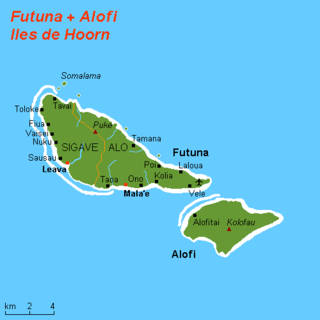
The Hoorn Islands are one of the two island groups of which the French overseas collectivity of Wallis and Futuna is geographically composed. The aggregate area is 115 km², and the population 4,873.
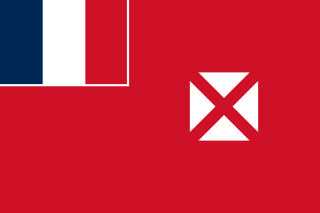
The following outline is provided as an overview of and topical guide to Wallis and Futuna:
Kapeliele "Gabriel" Faupala was the 51st Lavelua (King) of Wallis Island (Uvea), one of the three traditional kingdoms which comprise the French overseas territory of Wallis and Futuna. Faupala was officially crowned Lavelua on July 25, 2008, succeeding Tomasi Kulimoetoke II, who died in May 2007. He was removed from office in September 2014.

The constituency of Wallis and Futuna is a French legislative constituency covering the whole of the overseas collectivity of Wallis and Futuna. It is represented in the XVth legislature by Sylvain Brial an independent right-wing politician who defeated Napole Polutele in a 2018 by-election.

ʻUvea is one of the three official chiefdoms of the French territory of Wallis and Futuna in Oceania in the South Pacific Ocean.

Overseas France consists of thirteen French-administered territories outside Europe, mostly the remains of the French colonial empire that chose to remain a part of the French state under various statuses after decolonization. They are part of the European Union. This collective name is used in everyday life in France but is not an administrative designation in its own right. Indeed, the five overseas regions have exactly the same administrative status as the metropolitan regions while the five overseas collectivities are semi-autonomous and New Caledonia is an autonomous territory. Overseas France includes island territories in the Atlantic, Pacific and Indian Oceans, French Guiana on the South American continent, and several peri-Antarctic islands as well as a claim in Antarctica. Excluding the district of Adélie Land, where French sovereignty is effective de jure by French law, but where the French exclusive claim on this part of Antarctica is frozen by the Antarctic Treaty, overseas France covers a land area of 119,396 km2 (46,099 sq mi) and accounts for 18.0% of the French Republic's land territory. Its exclusive economic zone (EEZ) of 9,825,538 km2 (3,793,661 sq mi) accounts for 96.7% of the EEZ of the French Republic.

A referendum on becoming an overseas territory was held in Wallis and Futuna on 27 December 1959. The proposal was approved by 94.37% of voters. Every voter on Wallis voted in favour, whilst all but three of the votes against the proposal were cast in the Futuna Islands.
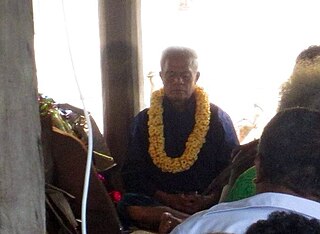
Petelo Sea was, from 2014 to 2016, tuiagaifo (king) of the Kingdom of Alo, one of the three traditional kingdoms located in the French Overseas Collectivity of Wallis and Futuna.
